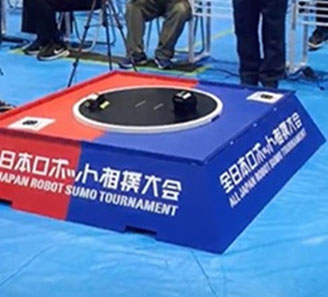Case Study: A “Stealth” Revolution in Robot Sumo with Infrared-Absorbing Sheets — Tokyo Polytechnic University’s Challenge


Tokyo Polytechnic University’s robot club, Karakuri Kobo, recently incorporated a unique material into their machines for the Kanto regional round of the All-Japan Robot Sumo Tournament. The material, Fineshut KIWAMI , was selected for its ability to absorb infrared light, making the robots harder to detect by their opponents’ sensors.
The Event at Tokyo Polytechnic University
The Kanto regional tournament took place on August 31 at the Atsugi Campus of Tokyo Polytechnic University. The venue was the university gymnasium, where competitions were divided into two categories: the 3kg class and the 500g class, with both autonomous and RC divisions. Karakuri Kobo participated in the 500g autonomous class, which was held on the lower level of the gymnasium, while the 3kg class was held on the upper floor.

The event began with an opening ceremony and speeches from guests before moving into the matches.
The Autonomous 500g Matches
In the 500g autonomous category, robots face off on a traditional sumo-style ring. Unlike RC-controlled robots, autonomous robots must detect their opponents using onboard sensors and respond accordingly, leading to strategic and unpredictable battles.
Karakuri Kobo entered four robots in this division. Their machines were covered with Fineshut KIWAMI, giving them a strikingly deep black appearance. This material not only absorbs visible light but also near-infrared light, enabling a potential “stealth effect” by making the robots less detectable to infrared sensors.

Since many robot sumo competitors rely on infrared sensors to locate their opponents, blocking or absorbing those signals creates an advantage—effectively making the robot “invisible” to its challengers.
Results and Insights
Although one of Karakuri Kobo’s robots achieved a win, none advanced to the national tournament this time. Still, the matches highlighted the creativity, determination, and technical skill of the student team. Professor Suzuki also shared data suggesting that stealth effectiveness varies depending on the type of sensor used, confirming that the material has measurable impact in certain scenarios.
The team has also registered for the Kansai regional tournament, and their results there are highly anticipated.
Looking Ahead
The Tokyo Polytechnic University robot club continues to push the boundaries of competitive robotics by experimenting with innovative materials like Fineshut KIWAMI. Their efforts show how advanced materials can open new strategies in robot sumo competitions.
Stay tuned as we continue to explore the World of Black! If you have any questions or inquiries, feel free to contact us at contact@the-black-market.com.
Purchase Link: https://tinyurl.com/3jn2atzx
SHARE:
